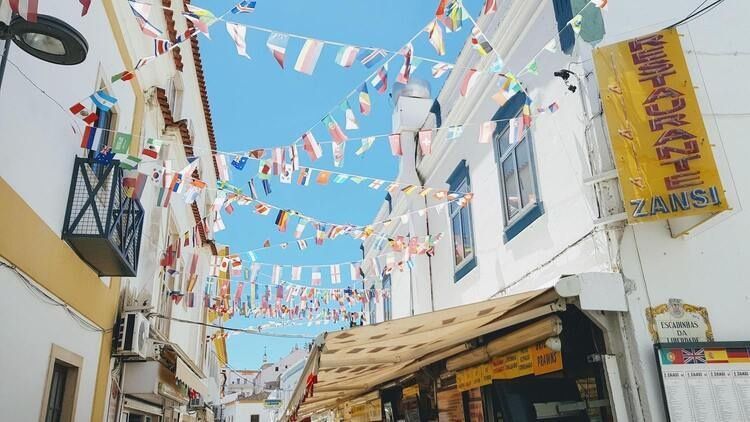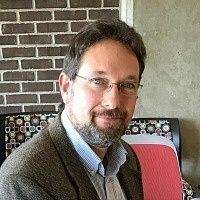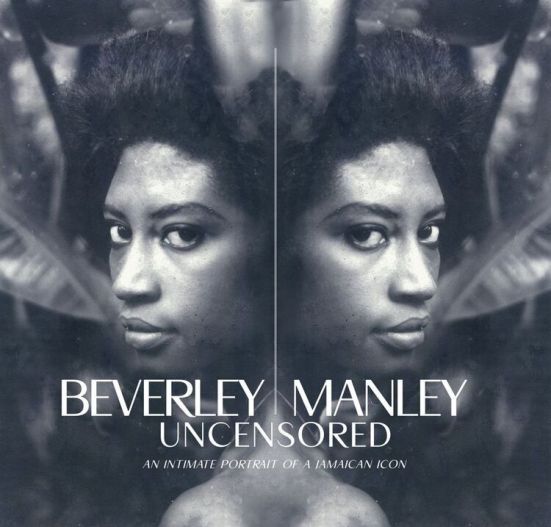Latin American and Caribbean Studies
Pedro X. Molina’s Delicate Achievement

Series Features Scholars Under Threat Alumni
"My body is here, but my heart and my work are still entrenched in the struggles of my people," says Nicaraguan cartoonist Pedro X. Molina.
Additional Information
Portuguese Conversation Hour

May 6, 2024
11:00 am
Join us on Zoom to practice your Portuguese skills and meet new people. Conversation Hours provide an opportunity to use the target language in an informal, low-pressure atmosphere. Have fun practicing a language you are learning! Gain confidence through experience! Just using your new language skills helps you learn more than you might think. Conversation Hours are are open to any learner, including the public.
Join Portuguese Conversation Hour on Zoom!
Additional Information
Program
Latin American and Caribbean Studies
El Salvador’s Risky Tradeoff: Exchanging Democracy for Security
![U.S. Secretary of State Michael R. Pompeo participates in a signing ceremony for the CSL Lease Extension with Salvadoran President Nayib Bukele, in San Salvador, El Salvador, July 21, 2019. [State Department photo by Ron Przysucha/ Public Domain]](/sites/default/files/styles/extra_large/public/2024-02/48342167582_934208f597_c.jpg?itok=agDW4R-B)
Gustavo Flores-Macías, LACS
Gustavo Flores-Macías, professor of government, says Ecuador is “almost like a second laboratory for Bukele’s policies. People are so desperate that they buy into the need for these iron-fist policies to bring down crime.”
Additional Information
A Florida Immigration Law Is Turning Farm Towns Into ‘Ghost Towns’

Mary Jo Dudley, LACS
Mary Jo Dudley, the director of the Cornell Farmworker Program, shares the agricultural risks that come with governmental mandates regarding immigration.
Additional Information
Information Session: Global PhD Research Awards

February 28, 2024
4:45 pm
The Amit Bhatia ’01 Global PhD Research Awards fund international fieldwork to help Cornell students complete their dissertations. Through a generous gift from Amit Bhatia, this funding opportunity annually supports at least six PhD students who have passed the A exam. Recipients hold the title of Amit Bhatia ’01 Global PhD Research Scholars. All disciplines and research topics are welcome. The award provides $10,000 to be used by the end of the sixth PhD year for international travel, living expenses, and research expenses.
Register for the information session. Can’t attend? Contact programs@einaudi.cornell.edu.
***
The Mario Einaudi Center for International Studies hosts info sessions for graduate and for undergraduate students. To learn more about funding opportunities, international travel, research, and internships, view the full calendar for spring semester sessions.
Additional Information
Program
Einaudi Center for International Studies
Reppy Institute for Peace and Conflict Studies
East Asia Program
Southeast Asia Program
Latin American and Caribbean Studies
Institute for African Development
Institute for European Studies
South Asia Program
Researching Afro-Andean Histories on the Coasts, in the Highlands, and in the Transatlantic and Transpacific

April 25, 2024
4:45 pm
Goldwin Smith Hall, G22
Latin American and Caribbean Studies Program (LACS) Seminar Series.
Co-sponsored: Department of History, Department of History of Art & Visual Studies
New colonial histories are being researched and written for the 1500s and 1600s to document the presence of people of the African Diaspora and explore their varied experiences in Iberia, the Peruvian highlands, and crossing the early Spanish Transpacific. Even where they were a minority of the local population or marginalized in the historical record, evidence of their actions and sometimes even their motivations can be located and analyzed.
Leo Garofalo is a History Professor at Connecticut College whose research draws attention to the central roles of Native Andeans, Afro-Peruvians, and enslaved and free Asians in shaping daily life within colonial cities. He uses the archives of the Spanish Inquisition in Madrid, Spain’s imperial bureaucracy in Seville, Rome’s Jesuit Archives, the local Church in Peru, and notaries and secular courts in Lima and Cuzco to uncover traces of the passage of the tens of thousands of West and Central Africans and hundreds of Asians forced into slavery and brought to the Andes in the 1500s and 1600s. His publications cover taverns, drinking, markets, seafaring and soldiering, the Afro-Iberian roots of Andean witchcraft, and the Atlantic, European, early trans-Pacific routes of the African and Asian Diasporas to the 16th- and 17th-century Andes. To support this research, he was recently awarded an Andrew W. Mellon Foundation Fellowship for Library Company of Philadelphia and a NEH Research Fellowship at the Center for Medieval & Renaissance Studies of St. Louis University.
Additional Information
Program
Einaudi Center for International Studies
Latin American and Caribbean Studies
Beverley Manley Uncensored Film Screening and Discussion

April 15, 2024
4:45 pm
Mc Graw Hall, MCG165
A Latin American and Caribbean Studies Program (LACS) Public Issues Forum funded by the US Department of Education's Title VI UISFL grant.
As the wife of Jamaica's former Prime Minister, Beverley Manley Duncan conversed with global players such as Fidel Castro, Winnie Mandela, and Pierre Trudeau. In this no-stone-unturned documentary, Beverley forces herself to confront her complicated past. What was it like to be a Black woman seated at the table? Does she play a pivotal or supporting role? As a Black nationalist, she wore large Afros and head turbans in corridors of power where they were typically not welcomed. She is controversial in her outspoken views of women's sexuality, infidelity, and domestic abuse. She is a powerful voice with wisdom to teach the ages. She is a critical link to where we have come from and a seer of where we might be going. The film Beverley Manley Uncensored lies at the complex intersection of race, class, gender, politics, and global power in a post-colonial society. Join us for a riveting film screening in McGraw Hall and live discussion with Beverley Manley and the filmmaker Joelle Simone Powe, both of whom will join us virtually.
Beverley Manley Duncan is the former first lady of Jamaica’s most famous Prime Minister, Michael Manley. As a champion for Women’s Rights and Black Nationalism, Mrs. Manley implemented changes that radically transformed Jamaican society in the 1970s by founding the Jamaican Women’s Movement, introducing paid maternity leave and equal pay for equal work statutes. She is a keen eyewitness of the most tumultuous decade in Jamaican political history. In 2012, she published her autobiography, the Manley Memoirs, to great discussion and acclaim. The book created shock waves across the Caribbean and diaspora. The four-part docu-series Beverley Manley Uncensored, on Beverley’s life and work, garnered half a million views and sparked a national debate with its intimate interviews and historical reflections.
"The entire country has been waiting to hear from the former wife of late Prime Minister Michael Manley. Beverley Manley Duncan has much to say about sex, politics, classism, imperialism, and political violence"
-The Jamaica Gleaner 2022
Joelle Simone Powe is an accomplished documentary film director, writer, and researcher from Jamaica. Her work explores controversial personalities and topics in Caribbean history and culture. Her debut documentary, "Out There Without Fear," explores Jamaica’s Dancehall dance. Her subsequent work, "Beverley Manley Uncensored," a four-part docu-series on the former First Lady of Jamaica, created a national storm with its exploration of a very vexing time in Jamaican history. Joelle is the founder of Out There Without Fear Dialogues, an educational platform that illuminates Caribbean stories through film, performance, and discussion with regional voices. Her events showcase diverse points of view and challenge academics and students to participate in a robust discussion on issues of race, culture, gender, politics, and international relations.
Please see the link to RSVP
https://www.outtherewithoutfear.org/event-details-registration/beverley…
Additional Information
Program
Latin American and Caribbean Studies
Einaudi Center for International Studies
Barring Trump from Ballot Could Backfire

Op-ed by Gustavo Flores-Macías
Gustavo Flores-Macías (LACS) shares lessons from Latin America in an op-ed in The Hill: "Barring candidates is unlikely to bring stability to the political system."
Additional Information
Information Session: Southeast Asia Program Undergraduate Opportunities

March 11, 2024
12:30 pm
Uris Hall, 153
The Southeast Asia Program (SEAP) gives students multiple ways to engage with Southeast Asia. Affiliate with our program to be informed of all SEAP events and activities. Undergraduates who minor in Southeast Asian Studies are advised by SEAP Program Faculty advisors who collaborate with them to construct a course of study based upon their area of interest. SEAP also runs the CU in Cambodia program for students interested in international travel.
Can’t attend? Contact seap@cornell.edu.
***
The Mario Einaudi Center for International Studies hosts info sessions for graduate and for undergraduate students. To learn more about funding opportunities, international travel, research, and internships, view the full calendar for spring semester sessions.
Additional Information
Program
Einaudi Center for International Studies
Reppy Institute for Peace and Conflict Studies
East Asia Program
Southeast Asia Program
Latin American and Caribbean Studies
Institute for African Development
Institute for European Studies
South Asia Program
Spanish Conversation Hour

May 7, 2024
6:00 pm
Stimson Hall, G25
Come to the LRC to practice your language skills and meet new people. Conversation Hours provide an opportunity to use the target language in an informal, low-pressure atmosphere. Have fun practicing a language you are learning! Gain confidence through experience! Just using your new language skills helps you learn more than you might think. Conversation Hours are are open to any learner, including the public. Campus visitors and members of the public must adhere to Cornell's public health requirements for events.
Additional Information
Program
Latin American and Caribbean Studies
